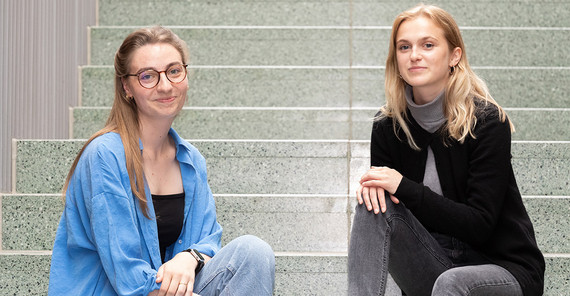A part-time job on the side? “That would hardly be possible for me,” says the 20-year-old student who already took part in the Voltaire program of the Franco-German Youth Organization while she was still at school. “The double degree also means a double study load, you must arrange everything according to two curricula, so to speak.” She is completing part of her studies at the Université Paris Nanterre.
Two international scholarships and the UP university scholarship, which supports her with 300 euros a month, provide financial security. She applied for the University Scholarship immediately after graduating from high school at the same time as applying for the degree program. Half of the money comes from the Deutschlandstipendium of the Federal Ministry of Education and Research.
Student, alumnus, sponsor
The other half comes from Stefan Groth in Buxtehude, a town 300 km away. For 10 years, tax consultant Groth has been supporting young academics through the University Scholarship Potsdam. Groth himself completed his Master of Laws (LL.M) at the University of Potsdam in 2012 - while working full-time. On weekdays, the business graduate optimized his clients‘ business figures. “On Fridays, I went to Potsdam to study, and on Mondays, I returned.”
The tax consultant found it enriching to have studied again in the middle of his professional life. Professionally, because he acquired knowledge, for example in the field of tax and commercial law, from which he directly benefits in his work today. But also personally, as he says. “You study in a completely different way when you know that you don’t necessarily need it to start your career,” Groth says.
The partner in a tax consultancy firm was already aware of his privileged position back then. After all, the Bologna reform had turned many subjects of study upside down. “I perceived the bachelor’s degree introduced at that time as much more akin to school than my previous diploma course,” Groth says. “With a lot of content packed into a relatively short time.”
Groth realized that full-time students, particularly those in disciplines that require intensive learning, had fewer opportunities to work part-time following the introduction of the new system. He heard about the option to sponsor other students and decided to help.
“We tax consultants are not a destitute occupation group. That is why I said to myself: Just do something!” And he did: While still a master’s student, he personally co-financed a first Deutschlandstipendium in the winter semester 2014/15. Today, Groth permanently supports three students at the University of Potsdam through this initiative.
Stipends reward school achievements and social commitment
He has no influence on their main areas of study or academic career. “I see myself in the field of international law, the EU or the United Nations,” says Antonia Pydde, who is also supported by Stefan Groth. The 21-year-old student from Ketzin in Brandenburg commutes about an hour to Potsdam and has a clear goal – the state examination and the integrated bachelor’s degree.
Due to her outstanding academic achievements but also her extracurricular commitment, the prospective lawyer was able to convince the scholarship awarding office. Participation in the Chemistry and Math Olympiad, the „Jugend debattiert“ (Youth Debate) program, and top grades in school-leaving exams: qualities like these pay off when applying for a scholarship.
In order to finance her life herself, Pydde works at the Chair of European and International Law and as an office clerk in her father’s crafts business. She also worked in a supermarket for a few semesters. “Thanks to the scholarship, I was able to quit this job and concentrate more on my studies,” she says. “It also motivates me because I want to show that I deserve the scholarship.”
It also makes more economic sense for students to graduate more quickly with the help of a scholarship, Groth says. Lawyers in particular are well-suited for careers in tax and business consulting. “It’s an exciting career field. You advise companies and see how and in what way they earn their money,” says the 51-year-old. “You maintain close contact with clients, get to know different sectors and can expect decent starting salaries.”
With his financial aid for young academics at the University of Potsdam, the Hanseat aligns with other private individuals as well as institutional sponsors such as SAP, Volkswagen, and Deutsche Bahn. “But it was never my goal to use a scholarship like this for our own recruiting,” Groth says. “For me, the altruistic motive prevails.”
Stefan Groth is an alumnus of the University of Potsdam and now supports students of law.
Sponsors currently fund an annual scholarship amounting to 1,800 euros. By supporting at least five students, they will have the opportunity to align their contributions with scholarship recipients based on specific disciplines.
More information and contact:
Marianna Bähnisch | 0331 977-153073 | stipendiumuuni-potsdampde
https://www.uni-potsdam.de/en/universitaetsstipendium/germanyscholarship
This text (in german language) was published in the university magazine Portal - Zwei 2024 „Europa“ (PDF).

